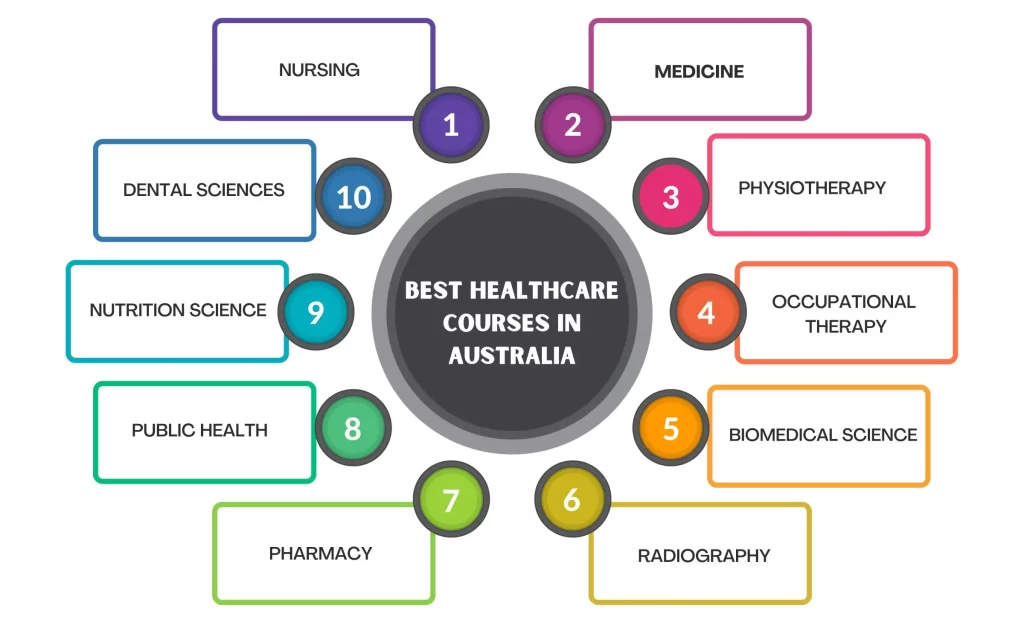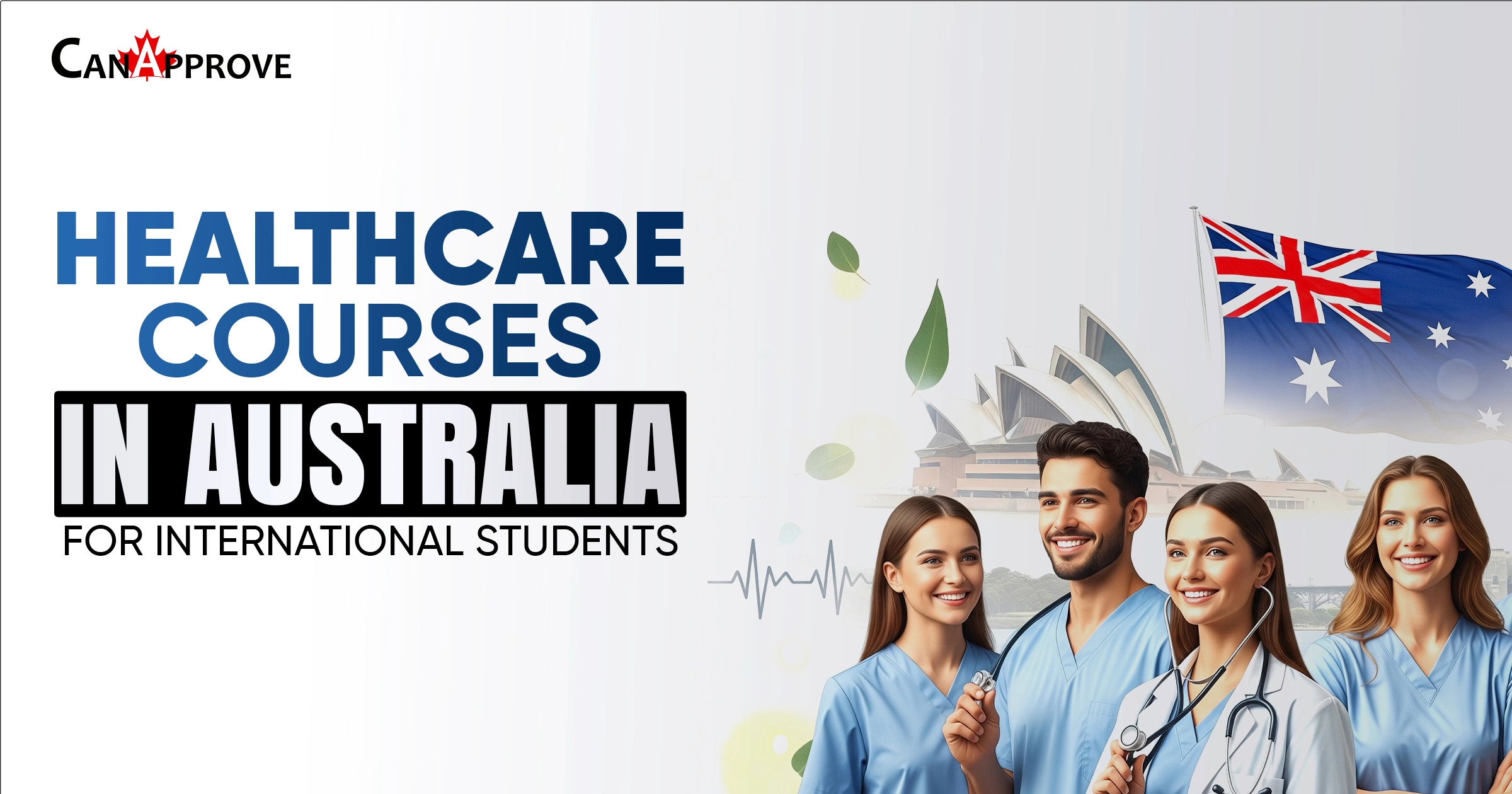Australia is a great place to study if you’re thinking about a career in healthcare. With top-quality education, hands-on training, and a strong healthcare system, it’s the perfect environment to get started. Healthcare courses in Australia are designed to equip you with the skills and knowledge needed for real-world roles. Whether you want to become a nurse, medical assistant, or work in hospital management, there’s something for everyone.
In this blog, we’ll walk you through everything you need to know from key benefits and popular short-term programs to fee structures and the best study options available.
Let’s get started!
Benefits of Studying Healthcare Courses in Australia
There’s a reason why healthcare studies in Australia are so popular among international students. They offer plenty of advantages that make both studying and building a career easier and more rewarding.
Here are the benefits of studying healthcare courses in Australia:
- Top-Quality Education
- Modern Research and Technology
- Strong Job Opportunities
- Practical Learning
- Friendly and Diverse Environment
- Work After Graduation
- Advanced Facilities
- Lots of Course Options
- Meaningful Careers
- Modern Facilities
- Variety of Specializations
- Rewarding Careers
Best Healthcare Courses in Australia
Top universities in Australia offer some of the best healthcare courses, with plenty of options in medicine, nursing, public health, and allied health.
Here is a list of the best healthcare courses in Australia:
1. Nursing
2. Medicine
3. Physiotherapy
4. Occupational Therapy
5. Biomedical Science
6. Radiography
7. Pharmacy
8. Public Health
9. Nutrition Science
10. Dental Science

Here’s a simple breakdown of the best healthcare courses you can study in Australia:
1. Nursing
Nursing is one of the most popular healthcare courses in Australia. It offers quality education, real-life training, and great job and migration opportunities. Here’s what you need to know about Bachelor of Nursing programs in Australia:
| Basic Requirements |
- Completion of Australian Year 12
- IELTS 7.0 and no less than 7.0 in each component
- Master’s: Nursing degree + experience
|
| Course Duration |
- Bachelor’s: 3 years full-time; part-time options can take up to 6 years.
- Master’s: 2 years
|
| Popular Courses |
|
| Top Universities |
- University of Queensland
- Monash University
- University of Sydney
- University of Technology Sydney
- Charles Darwin University
- Southern Cross University
- La Trobe University
- Deakin University
- Victoria University
- Charles Sturt University
|
| Job Opportunities |
- Registered Nurse in hospitals, clinics, aged care
- Specialize in ICU, pediatrics, midwifery
- High demand, PR options, post-study work visa available
|
2. Medicine
Medicine courses, like MBBS or MD, are among the most in-demand healthcare courses in Australia. Offered by some of the top Public Universities in Australia, these programs are well respected and help you become a qualified medical doctor
| Basic Requirements |
- Completion of class 12th (or equivalent), with a focus on Physics, Chemistry, and Biology (PCB)
- MD: Relevant bachelor’s degree with good GPA
- MD: Relevant bachelor’s + good GPA
- IELTS 7.0
- Entrance exams: UCAT / GAMSAT / MCAT
- MMIs for some universities
|
| Course Duration |
- MBBS: 5-6 years
- MD: 4 years
|
| Popular Courses |
- MBBS
- MD
- Dual degrees (e.g., MD + MPH)
|
| Top Universities |
- University of Melbourne
- Monash University
- University of Sydney
- University of Queensland
- UNSW Sydney
- Flinders University
- Griffith University
- University of Western Australia
|
| Job Opportunities |
- GP
- Specialist
- Public Health Officer
- Researcher
- Hospital Staff
|
3. Physiotherapy
Physiotherapy is one of the most demanding courses in Australia, offering a rewarding career with plenty of growth.All the important details are given below.
| Basic Requirements |
- Science subjects in high school (for Bachelor’s)
- Health/science degree for Master’s/Doctorate
- Work experience preferred for some courses
- IELTS/TOEFL required
|
| Course Duration |
- Bachelor: 4 years
- Master: 2 years
- Doctorate: 3 years
|
| Popular Nursing Courses |
- Bachelor of Nursing
- Master of Nursing
|
| Top Universities |
- University of Sydney
- University of Queensland
- University of Melbourne
- Monash University
- Curtin University
- La Trobe University
- University of Technology Sydney
- University of South Australia
|
| Job Opportunities |
- In demand in hospitals, sports, aged care, etc.
- Starting salary: AUD 68K-73K; experienced: AUD 100K+
- AHPRA registration required
- Overseas grads need APC assessment
- On Skilled Occupation List (PR/work visa benefit)
|
4. Occupational Therapy
Occupational Therapy helps people get back to daily life and do things they love after illness, injury, or disability. Here are the detailed information:
| Basic Requirements |
- Bachelor’s: Year 12 with English + Biology/Chemistry
- Master’s: Bachelor’s in health/science with human biology or psychology
- IELTS 7.0 for international students
|
| Course Duration |
- Bachelor: 4 years
- Master: 2 years
- Includes 1,000+ hours of clinical placement
|
| Popular Courses |
- BSc in Medical Lab Science / Biomedical Science / Medical Science
- Master of Medical Lab Science (for science graduates)
|
| Top Universities |
- University of Queensland (UQ)
- University of Sydney
- Curtin University
- Deakin University
- La Trobe University
- Monash University
- University of Adelaide
- Southern Cross University
- Swinburne University of Technology (for Master’s/Graduate Entry)
|
| Job Opportunities |
- Work in hospitals, schools, aged care, rehab, disability services, clinics, NGOs, and telehealth
|
5. Biomedical Science
Biomedical Science is one of the key healthcare courses in Australia, focusing on finding answers behind the scenes by testing samples, spotting diseases early, and helping doctors treat patients better.
| Basic Requirements |
- Year 12 or equivalent
- Subjects: English, Chemistry, Biology, Maths
- IELTS: 7.0 (depends on university)
|
| Course Duration |
- BMLSc: 3.5–4 years
- Biomedical Science: ~3 years
- Master’s: 2 years (related background)
|
| Popular Courses |
- BMLSc, Biomedical Science, Medical Science
- Master of Medical Laboratory Science
|
| Top Universities |
- University of Queensland (UQ)
- Monash University
- University of Sydney
- University of Technology Sydney (UTS)
- University of Southern Queensland (UniSQ)
- Southern Cross University (SCU)
- Griffith University
- La Trobe University
- Deakin University
|
| Job Opportunities |
- Work in hospitals, labs, pharma & research
- Roles in QC, lab management, clinical trials
- PR-friendly with strong job demand
|
6. Radiography
Radiography/Medical Imaging is all about using scans like X-rays and MRIs to help doctors see what’s happening inside the body and diagnose health problems early.
| Basic Requirements |
- Secondary education with Biology, Physics, Maths
- Competitive grades (Year 12 or equivalent)
- Police clearance, immunizations, First Aid (may be needed)
- Selection task or statement (some universities)
- Must meet physical health/safety standards
|
| Course Duration |
- University of Canberra (UC): 3.5 years (accelerated)
- CQUniversity (CQU): 4 years (online + campus)
- Others (RMIT, UniSA, USYD): 4 years
- Includes 1,400+ hours of clinical training
|
| Popular Courses |
- Bachelor of Medical Imaging
- Bachelor of Medical Radiation Science
- Master of Diagnostic Radiography
|
| Top Universities |
- University of Canberra
- University of South Australia
- RMIT University
- CQUniversity
- Charles Sturt University
- University of Sydney
|
| Job Opportunities |
- Work as Diagnostic Radiographers
- In hospitals, clinics, imaging centers
- High demand + on skilled migration list
- Strong post-study work and PR prospects
|
7. Pharmacy
Pharmacy is all about helping people stay healthy by giving the right medicines and advice on how to use them safely.one of the key healthcare courses in Australia with strong career demand.
| Basic Requirements |
- Science background in high school or related degree
- For PG: Bachelor’s in Pharmacy or similar
- IELTS score around 7.0
- Statement of Purpose (SOP), Letters of Recommendation (LORs), resume, interview (if needed)
|
| Course Duration |
- BPharm (Hons): 4 years
- MPharm: 2 years (with placements)
- PharmD: 3–4 years
|
| Popular Courses |
- Bachelor of Pharmacy (Honours)
- Master of Pharmacy
- Doctor of Pharmacy
- Clinical electives & research options
|
| Top Universities |
- Monash University
- University of Sydney
- University of Queensland (UQ)
- University of Western Australia (UWA)
- Griffith University
- University of Technology Sydney (UTS)
- University of South Australia (UniSA)
|
| Job Opportunities |
- Register after 1-year internship
- Work in hospitals, retail, pharma, or research
- High demand + PR opportunities
|
8. Public Health
Public Health focuses on keeping communities healthy by preventing disease and promoting well-being for everyone.
| Basic Requirements |
- Pharmacy graduates can register after 1-year internship
- MPH: Any Bachelor’s degree + English proficiency
- Some universities may require work experience
|
| Course Duration |
- Most postgraduate public health courses in Australia take 2 years full-time
|
| Popular Courses |
- Master of Public Health (MPH)
- Master of International Public Health
- Bachelor of Public Health
|
| Top Universities |
- University of Melbourne
- Curtin University
- University of Western Australia
- University of Queensland
- Griffith University
- La Trobe University
- University of Technology Sydney
|
| Job Opportunities |
- Public Health Officer
- Epidemiologist
- Policy Analyst
- Health Promotion Specialist
- Disease Control Specialist
- Global Health Specialist
- Researcher
|
9. Nutrition Science
Dietetics/Nutrition Science covers helping people eat right and stay healthy through food and lifestyle choices.
| Basic Requirements |
- Year 12 or equivalent
- Science background (especially Biology)
- English proficiency & student visa
- Some courses have practice-based requirements
|
| Course Duration |
- Bachelor: 4 years
- Dual Degree (Bachelor + Master): 4 years
|
| Popular Courses |
- Bachelor of Nutrition and Dietetics
- Dual Degree / Honours / Research
|
| Top Universities |
- University of Queensland (UQ) – St Lucia campus
- Flinders University
- University of Wollongong
- Australian Catholic University (ACU)
- University of Sydney (offers combined science and nutrition/dietetics degrees)
|
| Job Opportunities |
- Clinical, Community, Sports, or Food Industry Dietitian
- Nutrition Researcher
- Public Health Officer
|
10. Dental Science
Dental Sciences is a part of healthcare courses in Australia, focused on keeping smiles healthy, studying teeth, gums, and mouth care to prevent and treat dental problems.
| Basic Requirements |
- UG: High school with good ATAR
- PG: Relevant bachelor’s degree
- Selection: Academics, interview, UCAT ANZ/ISAT
- IELTS 7.0+ (Academic)
- Prerequisites: Chemistry, Biology, sometimes Math
|
| Course Duration |
- Bachelor’s (BDS/BDSc Hons): 5 years
- Doctor of Dental Medicine: 3–4 years (PG)
|
| Popular Courses |
- BDS / BDSc (Hons)
- Doctor of Dental Medicine (DMD)
- Dental Health Science
|
| Top Universities |
- University of Melbourne
- University of Queensland
- University of Western Australia (UWA)
- James Cook University
- University of Sydney
- La Trobe University
- Griffith University
- Charles Sturt University
|
| Job Opportunities |
- Register with Ahpra
- Work as dentist, surgeon, orthodontist
- Public health, research, teaching
- High demand + ADC exams for overseas grads
|
Healthcare Course in Australia Fees
If you’re planning to study healthcare in Australia, it’s good to know how much it might cost. Fees can change depending on the course, university, and whether you’re doing a diploma, bachelor’s, or master’s. To ease the financial burden, you can also explore Scholarships to Study in Australia, which are offered by many universities and institutions.
Below is an overview of the average tuition fees for healthcare courses in Australia:
| Course Type |
Average Annual Tuition Fee (AUD) |
| Bachelor of Nursing |
20,000 – 40,000 |
| Paramedicine (Bachelor) |
40,200 |
| Physiotherapy (Bachelor/Master) |
57,200 |
| Bachelor of Medical Science |
52,000 – 54,000 |
| Medicine (MBBS/Bachelor/Doctor) |
40,000 – 92,000 |
| Dentistry (Bachelor/Master) |
50,000 – 80,000 |
| Master of Public Health |
30,000 – 55,000 |
| Bachelor of Health Science |
30,000 – 40,000 |
Short Medical Courses in Australia
Short medical courses in Australia are a great way to boost your skills or explore a healthcare career without committing to a long-term degree. These practical and flexible programs are part of the wide range of healthcare courses available through the Australian Education System, making them perfect for gaining hands-on experience in a short time. While short courses themselves don’t typically offer post-study work rights, completing them can be a stepping stone to further qualifications in Australia that do, opening pathways to work experience and even long-term career opportunities in the country.
So, here are the popular short medical courses in Australia:
- Dental Assistant Certificate
- Mental Health Certificate
- Medical Reception Certificate
- Certificate IV in Leisure and Health
- Certificate III in Non-Emergency Patient Transport
- Nursing Assistant Certificate
- Certificate IV in Disability and Health
- Certificate III in Health Administration
- Certificate in Diabetes Management
- Massage Certification
- Certificate III in Pathology Collection
Conclusion
We hope this blog gave you a clear idea about healthcare courses in Australia from the benefits and top programs to fees and short course options. If you’re dreaming of a career in healthcare, Australia is a great place to start. You’ll get quality education, real-world training, and good job opportunities. Want to double check anything? Visit the official Study Australia website.
And if you need help choosing the right course or applying, CanApprove is here to support you all the way!
Frequently Asked Questions
Which medical course is best in Australia?
The top medical course in Australia is the MBBS or MD, with the University of Melbourne ranked best for medicine in 2025, followed by Monash, Sydney, Queensland, and UNSW.
What is Australia’s healthcare program?
Australia’s healthcare system, centered on Medicare, ensures affordable, accessible care through public hospital services, subsidized medicines, and support programs, with both public and private options.
What is IHM Australia?
The Institute of Health & Management (IHM) Australia is a TEQSA-accredited institute offering industry-recognized postgraduate healthcare programs, especially in nursing, management, and health sciences.
What is the shortest medicine course in Australia?
The fastest path to become a registered doctor in Australia takes about 8 years, 3 years for an undergraduate degree, 4 years for an MD, plus a 1-year internship.
How much does a healthcare degree cost in Australia?
Healthcare degrees in Australia cost around AUD 20,000–55,000 per year, with programs like medicine or dentistry going up to AUD 90,000.
How long does it take to complete a healthcare course in Australia?
Healthcare course durations in Australia range from a few months (short certificates) to 6 years (MBBS), depending on the level and specialization.






